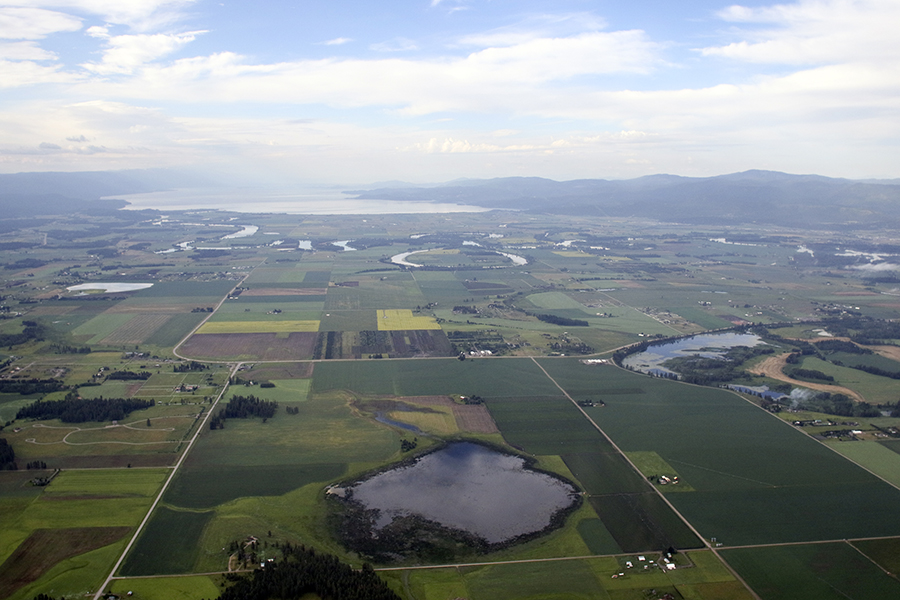A Flathead County district judge heard arguments this week in a lawsuit filed by opponents of a water-bottling plant near Creston, where plaintiffs say a citizen-initiated ballot measure precludes the facility from future expansion.
The lawsuit — filed by the Egan Slough Community, Yes! For Flathead Farms and Water, and resident Amy Waller — was originally filed in 2018 in Flathead County District Court against the Flathead County Commission, the Flathead County Planning Department, the Flathead City-County Health Department, and the Montana Artesian Water Company (MAWC).
Flathead County District Judge Robert Allison on Nov. 12 heard oral arguments from attorneys on both sides of the wide-ranging issue, with counsel for plaintiffs seeking to resolve the lawsuit through summary judgment based on their contention that the ballot initiative, which passed in June 2018 with 70 percent of the vote, prohibits industrial operations like MAWC.
Controversy over MAWC began as soon as the company’s owner, Creston landowner Lew Weaver, applied for permits from the state Department of Environmental Quality (DEQ) and Department of Natural Resources and Conservation (DNRC), the validity of which is now under consideration by the Montana Supreme Court after a separate legal challenge resulted in the district court overturning the DNRC’s decision to issue the permits.
Prior to the lower court’s decision reversing the decision, Weaver had received a permit with the DNRC that would allow his company to produce up to 140,000 water bottles per hour, 24 hours a day, seven days a week. The water right allowed Weaver’s company to receive 710 acre feet of water annually, equaling roughly 1.2 billion 20-ounce water bottles.
Opponents to the water-bottling facility have pushed back against the project through various legal channels, including a ballot initiative that expanded the Egan Slough Zoning District, which protects the land’s agricultural character. The zone also prohibits most industrial uses.
Those changes added 530 acres to the existing 1,150 acres in the zone, including Weaver’s facility, which, under the zoning district, is in violation of the district’s regulations.
However, Weaver maintains the facility is grandfathered into the newly expanded zoning district and that it may operate to an extent consistent with its permits, even though it hadn’t begun full-scale commercial production at the time of the zoning district’s expansion.
“Here, a commercial water bottling operation existed on the property beginning in 2014. The extent of its existence included all essential property necessary to operate a commercial water bottling facility,” according to attorneys for MAWC. Therefore, MAWC is also protected under the Egan Slough Zoning District regulations.
That argument doesn’t pass muster with the plaintiffs’ attorneys, who say the zoning district’s exceptions for “pre-existing non-conforming uses” occurring prior to passage of the ballot initiative don’t apply to MAWC.
“MAWC did erect a prefab steel barn-like structure predating the Zoning Regulations and the Plaintiffs are not arguing that the building must be removed,” attorneys wrote in a brief in support of their motion for summary judgment. “But allowing the building to remain is a far cry from allowing an industrial operation in that building to begin any commercial production and develop into a full-blown operation over the next 20 years.”
Rather, the zoning regulations allow pre-existing non-conforming uses to continue but only to the “manner and extent” present at the time of the enactment of the zoning regulations, they argue.
“All of the facts here demonstrate that the ‘manner and extent’ of the MAWC operation as of June 21, 2018, and the operation’s use of the building, was not in commercial operation, or anything close to that,” according to plaintiffs’ attorneys.
Therefore, the MAWC facility as Weaver intends to operate it is not a “permitted use” within the zone, they say.
Judge Allison has taken the arguments under advisement but has not yet issued a decision, which could take months.
